Postpublished at 19:37 BST 4 August 2014
"Every war is cruel but this war was unlike any other with its unspeakable carnage, unbearable loss and almost unbelievable bravery", Mr Cameron says.
Monday 4 August 2014 marked the 100th anniversary of the start of Britain's involvement in WW1
About 17m soldiers and civilians worldwide were killed between 1914 and 1918
Royal Family members and world leaders attended commemorative events in the UK and elsewhere
An international ceremony of reconciliation was held outside the Belgian city of Mons
The day's events ended with a candle-lit vigil at Westminster Abbey and "lights out" events around the UK
Tom Moseley, Patrick Evans, Dhruti Shah, Anna Jones, Claire Bates, Nick Eardley, Kerry Alexandra, Kate McGeown and Gerry Holt
"Every war is cruel but this war was unlike any other with its unspeakable carnage, unbearable loss and almost unbelievable bravery", Mr Cameron says.
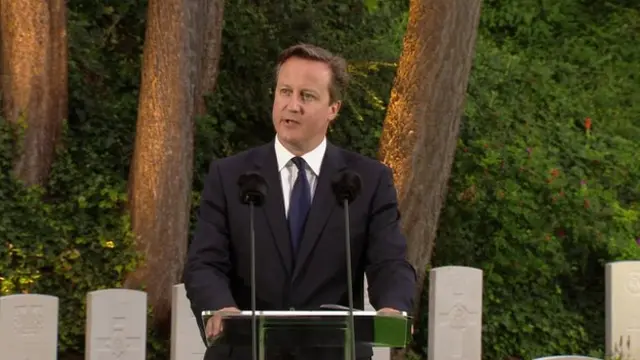
David Cameron is now speaking.
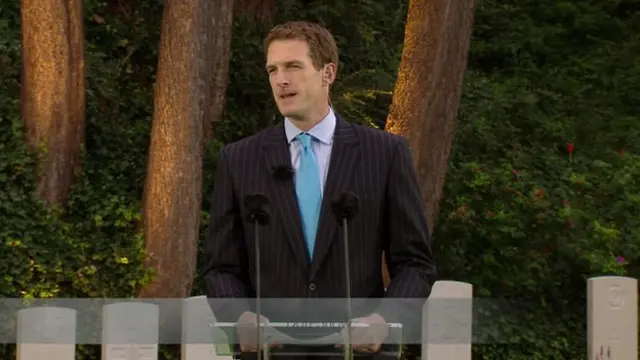
Opening the ceremony, historian Dan Snow says: "This war had an impact like no other. The emotional shock was felt in all corners of the globe".
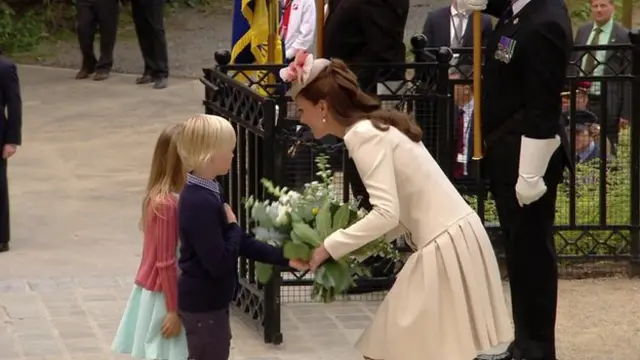
The Duchess of Cambridge was handed a bouquet by two children before the guests took their seats for the ceremony at St Symphorien cemetery.
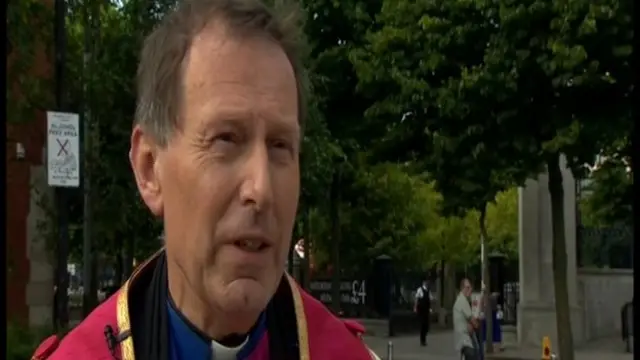
Dean John Mann, who is involved in the commemoration service at St Ann's Cathedral in Belfast tonight, says: "One of the things we're very conscious of is how easy it is for countries to move in to a war situation and how difficult it is to move out of that."
 News from 1914
News from 1914
The world on the brink of war
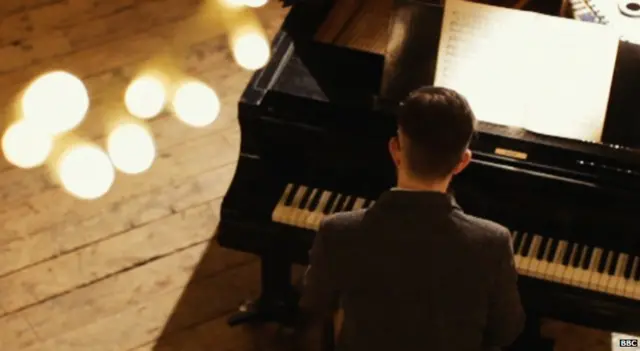
Gareth Malone plays WW1 songs
Popular songs in WW1
Popular songs were used to boost soldiers' morale and keep up spirits at home. Songs such as 'We Don't Want to Lose You, but We Think You Ought to Go' proved popular in music halls in the early months of the war, as did anti-German songs like 'When Belgium Put the Kybosh on the Kaiser'. Meanwhile 'Pack up Your Troubles' was sung both at home and on the front line.
Author Sebastian Faulks, who will be reading from his novel Birdsong in Westminster Abbey later, told the BBC World War One "has really come to the front of people's imagination" in the past year.
David Bright emails: My grandfather Isaac Thomas Pritchard of the 2nd South Lancs Regiment had been in the Army for 20 years when WW1 started. He was awarded the 'Medaille Millitaire' during the Battle of Mons and was the first soldier from the 2nd South Lancs to be awarded this medal. He was in the front line through all the major battles until he received a compassionate discharge in July 1917 after my grandmother died, leaving six children.
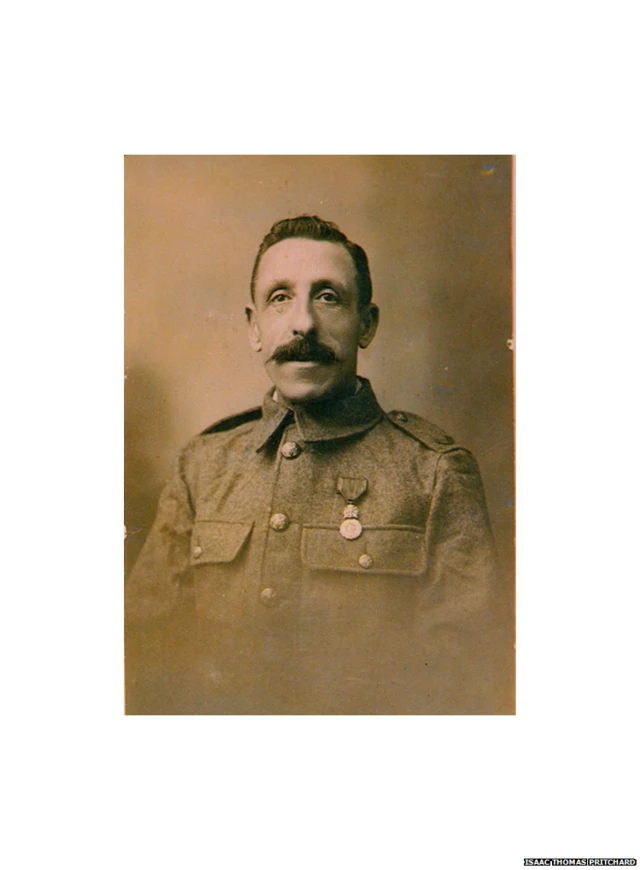 Image source, Isaac Thomas Pritchard
Image source, Isaac Thomas Pritchard Historian Dr Eamon Phoenix tells BBC Northern Ireland: "Something like 200,000 Irishmen joined up and at least 40,000 died... Some did so for patriotic reasons and some because of poverty... Really, you had Ireland very much committed to Britain's war effort."
Belgian Prime Minister Elio Di Rupo has arrived at the Mons ceremony, as has German President Joachim Gauck.
Prime Minister David Cameron is waiting with the royals and Culture Secretary Sajid Javid at St Symphorien cemetery ahead of this evening's ceremony.
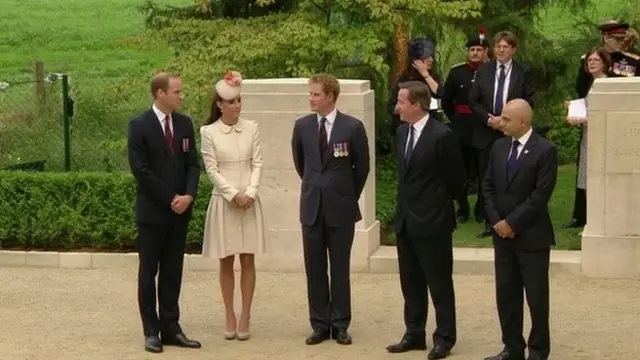
David Paul Walker emails: My grandfather Jimmy Walker told lots of tales and stories of life in the trenches.
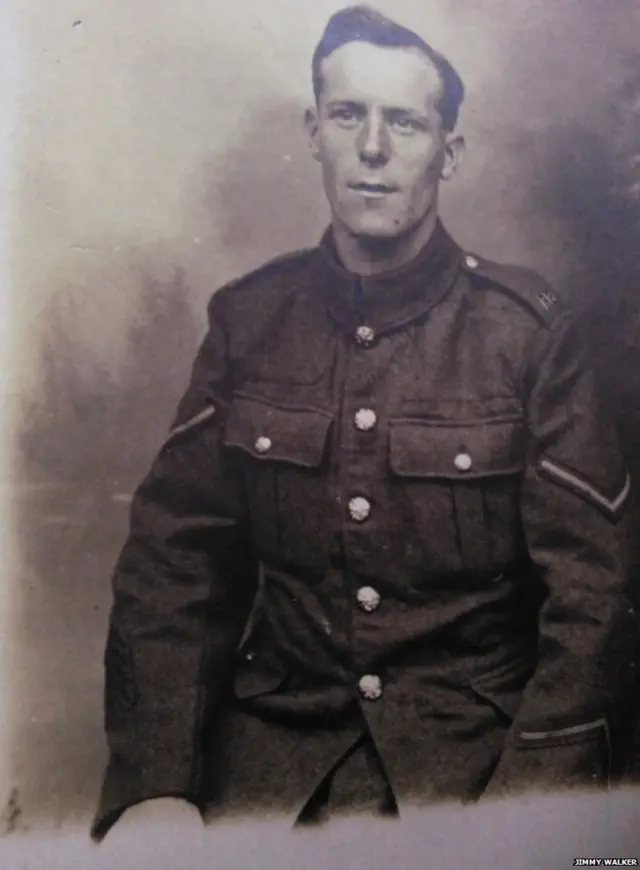 Image source, David Paul Walker
Image source, David Paul Walker News from 1914
News from 1914
The world on the brink of war
"The considerable number of clerks, waiters, etc. who hail from France, Germany, Belgium, etc. are hastening away to join their respective armies." Manchester Evening News
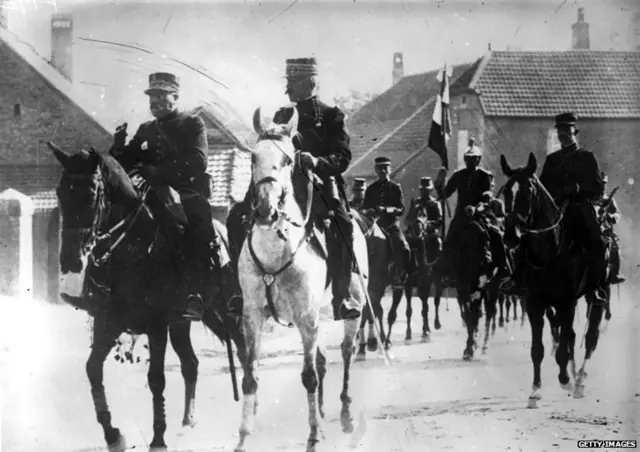 Image source, Getty Images
Image source, Getty ImagesFrench soldiers travel to the Front
A scramble across borders
In the summer of 1914, as peace turned into war, many Europeans in Britain found themselves facing important questions. As the countries of France, Belgium and Germany mobilised their forces, many foreign workers in Britain hastened back to join their nations' armies.
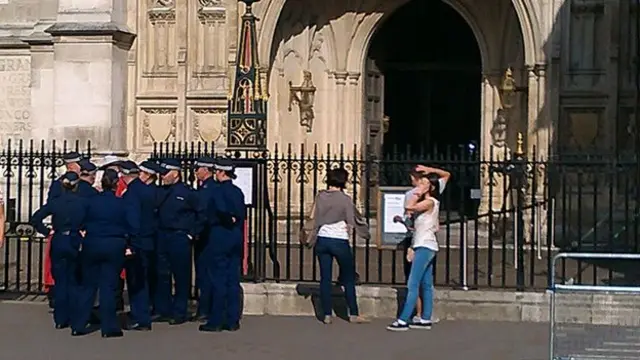 Image source, ALAMY
Image source, ALAMYA large security operation is under way at Westminster Abbey ahead of tonight's service, says BBC correspondent Tom Bayly, who has sent us this picture. Members of the public are being cleared from the front of the Abbey.
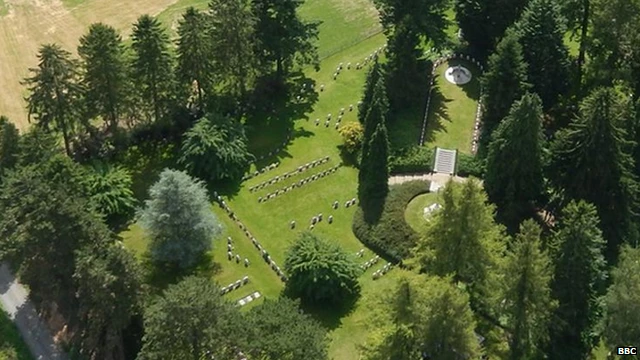
@bbcww1 tweets:, external The first & last British soldiers to die in #WW1 are buried at St Symphorien #Remember
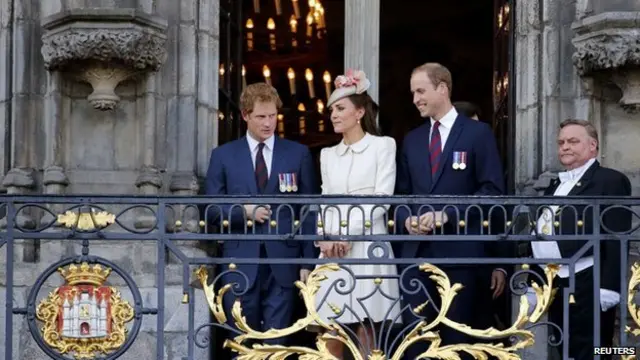 Image source, Reuters
Image source, ReutersThe Duke and Duchess of Cambridge and Prince Harry greeted crowds from the balcony of Mons town hall ahead of this evening's ceremony.
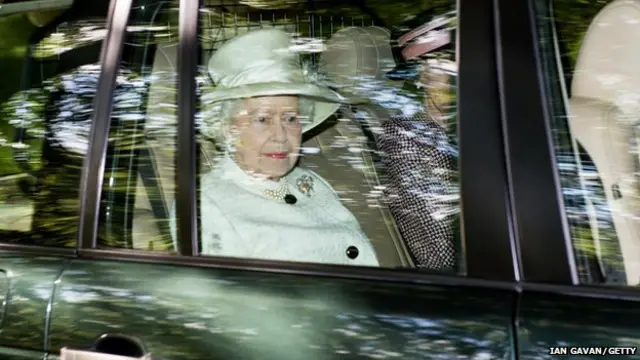 Image source, Ian Gavan/Getty
Image source, Ian Gavan/GettyThe Queen, who is staying at Balmoral, attends a service of commemoration at Crathie church in Aberdeenshire.
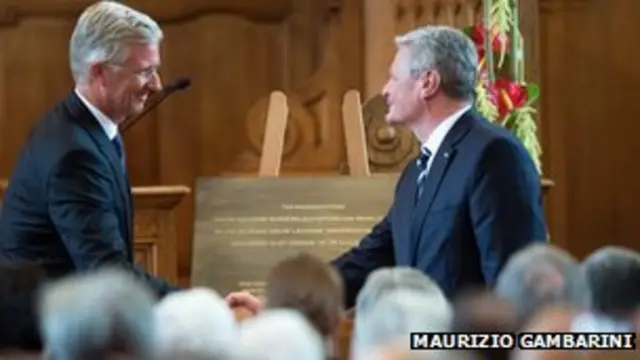 Image source, MAURIZIO GAMBARINI
Image source, MAURIZIO GAMBARINIA handshake between German President Joachim Gauck (right) and Belgium's King Philippe after they unveiled a commemorative plaque at the university in Leuven, Belgium.
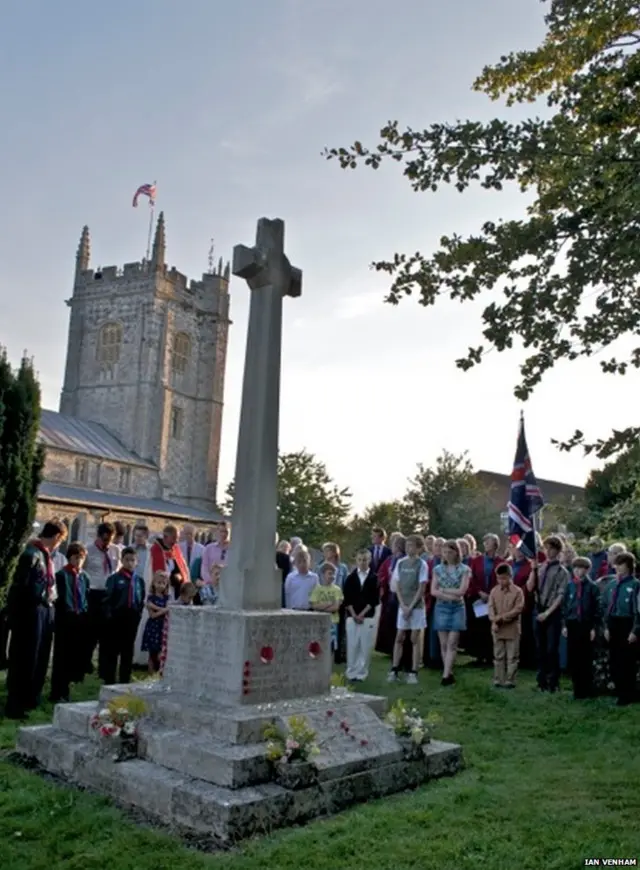 Image source, Ian Venham
Image source, Ian VenhamIan Ventham emails: A moving service attended by nearly 200 parishioners was held yesterday evening at Bere Regis parish church. The service was preceded by a peal of five of the six half-muffled bells, as the sixth bell 'Pax' was installed as a memorial after the war. During the service, Leading Seaman Luke Brady carried the Book of Names of the war dead to be received at the altar. The service ended with 28 young people from the village carrying lighted candles to the War Memorial in memory of the 28 war dead from the village, as a piper played a lament and a single bell tolled.
 News from 1914
News from 1914
The world on the brink of war
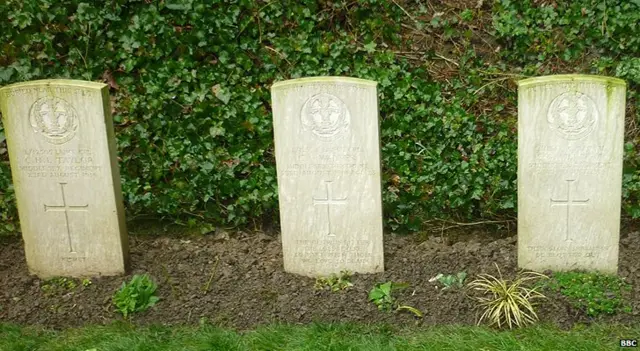
St Symphorien Military Cemetery in Belgium
St Symphorien Military Cemetery
The cemetery was set up by the German Army in August 1914 to bury the British and German soldiers who lost their lives at the Battle of Mons.
The cemetery has special significance because it is the final resting place of the first and last British soldiers to be killed in World War One.